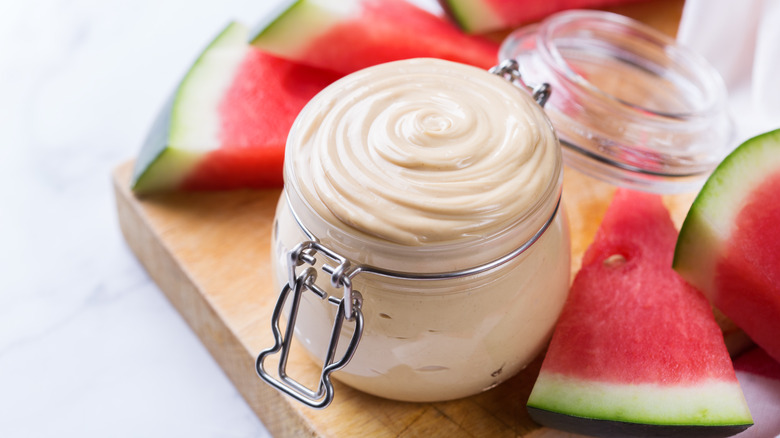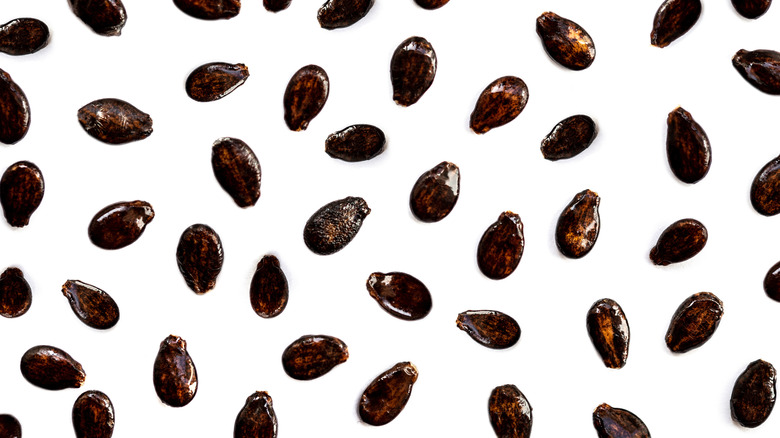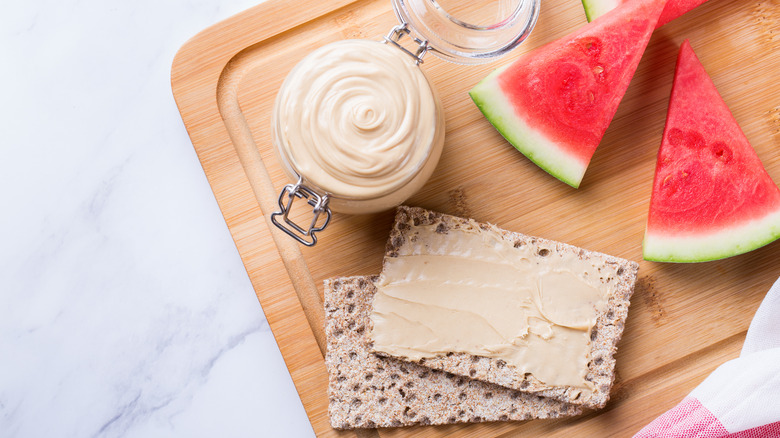Save Your Watermelon Seeds For A Tahini-Esque Butter
Are you eating only one part of your watermelon? Not in this economy! It's time to rethink everything you were told about what parts of plant foods are edible. If you're not making a granita with your carrot tops, or a vinegar with apple scraps, or even whole lemon lemonade, then you're basically throwing away money.
When it comes to the trusty, favorite watermelon, while you may originally buy it for that sweet, hydrating red flesh, it's good to know you can also use every part of the melon rather than throwing any of it away. Some ideas include making a kimchi out of the rind and grinding the seeds into a delicious seed butter.
You heard that right. When shelled and finely ground, watermelon seeds turn into a lush seed butter similar to a mild cousin of tahini. If you already love sunflower butter, this one is for you, providing a sustainable idea for a protein-packed snack.
Making watermelon seed butter can be done by shelling or sprouting
To make watermelon seed butter, the first step is to, of course, get yourself a good melon — just make sure it's one that actually has its seeds intact, as seedless varieties have become more and more popular and take over grocery stores. Once you're ready to cut up the watermelon, remove the black seeds by hand (ignore the white seeds), then rinse in a colander and roast on a baking sheet in the oven for about 10-15 minutes.
The hardest part comes after this step, when you have to shell them, which can take some dedication. Once done, blend the shelled seeds in a food processor until you achieve the desired consistency, adding a neutral oil as needed.
Another option is to sprout your watermelon seeds. This requires a little more advance preparation, but is easier than individually shelling seeds since they will naturally fall off. To do so, soak the watermelon seeds in water for three days, or until they grow sprouts that are a quarter-inch long. Then, rinse the sprouted seeds and allow them to dry fully before blending and continuing on with the process. In addition to naturally losing their shells, sprouted seeds may have added nutritional benefits. According to the American Heart Association, sprouted seeds have more vitamins B and C as well as antioxidants, which can help ward off cancer and boost the immune system.
Ways to enjoy watermelon seed butter
The result of your efforts will be a creamy, pale seed butter with a delicate earthy flavor that plays well with others. You can use it like you would use any other seed or nut butter — on toast, drizzled over ice cream, or as part of a savory sauce. You can also use it in place of tahini in hummus, or in a smoothie, or stirred into soup.
Like tahini, watermelon seed butter is a great substitute for peanut butter or other nut butters, if you're trying to avoid triggering any allergies. Watermelon seed butter is also high in protein, low on the glycemic index, and full of nutrients like magnesium, zinc, and iron.
If you don't want to go to the trouble of sprouting or de-shelling and making it yourself, you can purchase many seed butters online. Though, it remains difficult to purchase pre-made watermelon seed butter. The brand 88 Acres used to sell it online, but appears to have discontinued the product.



